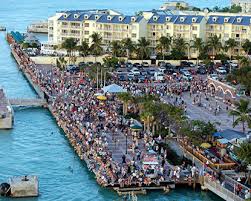Mallory Square restaurant vote postponed for third time
BY PRU SOWERS
KONK LIFE STAFF WRITER
Local restauranteur Joe Walsh was hoping last week that he might finally get an answer on his eight-plus year effort to build a restaurant and museum in Mallory Square.
No dice.
Although Walsh’s proposal to build a 156-seat restaurant on the edge of Mallory Square was initially on the Oct. 2 city commission agenda, it was postponed to Dec. 4 and now to Jan. 15 as the city’s lawyers look for a legal strategy to overturn a special magistrate ruling in favor of Walsh. The city’s Historic Architectural Review Commission (HARC) has denied the project twice, the last time in May 2017 after Walsh’s company, Tropical Soup, revised the project to address HARC concerns. After the second HARC denial, Walsh appealed the decision and a special magistrate ruled in Tropical Soup’s favor in August 2017.
The city appealed that decision but the special magistrate reaffirmed his ruling in February this year. As a result, city Attorney Sean Smith is now exploring whether the “material changes” Walsh made to the project design to accommodate planning board concerns may punt the project back to HARC for a new review. In that case, Smith is arguing, the special magistrate ruling in Walsh’s favor would be moot because of the amended application.
While frustrated, Walsh said the delay is only hurting Key West taxpayers because he estimates he would be paying the city $35,000 a month to rent the space along the edge of Mallory Square where two historic cable huts are located. Walsh is proposing to restore one of the cable huts into the restaurant and build a Mallory Square historical museum in the adjacent “hospitality hut.”
“The property continues to deteriorate and continues to be an eyesore and the city isn’t getting rent,” Walsh said after the latest postponement.
All the design and engineering plans have been finalized so Walsh’s exposure from the delay is primarily the legal fees he continues to pay to get the project before the commissioners. But even then, a decision allowing the project to break ground is not assured. The last time Walsh went before commissioners, then-Mayor Craig Cates and Commissioner Jimmy Weekley worried about the deteriorating condition of the three structures. If the city and Walsh cannot come to an agreement quickly, Weekley wondered whether the project should be put out to bid again.
Commissioner Sam Kaufman wants the area developed as soon as possible. But because the city’s legal department has not included any background paperwork with the resolution that explains the issues, he has been unable to form an opinion.
“It’s hard to have an opinion when there’s not a single piece of paper that’s been attached to it,” he said about the thrice-postponed plan. “Have you seen the cable huts? It’s just getting worse and worse. It’s an embarrassment.”
If commissioners ultimately reject the major development plan or put the project back out to bid, Walsh said he will sue because the proposal meets all the criteria the city requires for approval of a major development plan.
“In the unlikely event they [commissioners] actually turn it down at the end, I don’t know. I’ll probably litigate for breach of contract,” Walsh said.
One of the points of contention is that Walsh believes he has had a contract with the city since May 2010 to rent the cable hut location. But city attorney Smith told commissioners at their Sept. 5 meeting that no contract was ever negotiated with Walsh.
Walsh has redesigned the project several times over the past eight years to address concerns from city planners and commissioners about the size and scope of the restaurant. Since then, the project has received approval from the city planning department, the planning board, the tree commission and with the special magistrate ruling, HARC. The last step would be approval by city commissioners.
The cable huts, also known as cable tanks because part of the structures were built underwater to preserve the gutta-percha cables, are considered historic structures in Key West; the first built in 1921 and the second in 1930 to store the telephone cables that were first laid in in the early 1920’s and opened communication between Cuba and the mainland for the first time. The huts are a resource listed in the National Register of Historic Places.




Hey, the Mob will get their chow hall and make money one way or another.